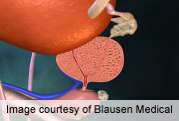PSA rise with testosterone gel tied to specific factors

(HealthDay)—Factors predicting greater prostate-specific antigen (PSA) increases with use of testosterone gel (T-gel) include age 60 years and older, baseline testosterone (T) ≤250 ng/dL, and percentage of free PSA <20 percent, according to a study published in the November issue of the Journal of Sexual Medicine.
Abraham Morgentaler, M.D., from Harvard Medical School in Boston, and colleagues evaluated 274 hypogonadal adult men (mean age, 53.5 years) with baseline T concentrations <300 ng/dL, PSA ≤2.5 ng/mL, and a negative digital rectal examination. The men were randomized to receive either once-daily T-gel for T therapy (234 participants) or placebo (40 participants).
The researchers found that baseline mean T values were 247 ng/dL, while mean PSA levels were 0.9 ng/mL and mean percentage of free PSA (%fPSA) was 24.6. Among men treated with T-gel, there were increases in T and PSA (P = 0.0012). Compared to baseline, in the placebo group, T increased, while PSA decreased. The PSA increase was greater in men 60 years and older than in men younger than 60 years (P = 0.0006). Mean PSA only changed in men with baseline T ≤250 ng/dL (P = 0.0031). In men with baseline %fPSA <20 percent, PSA increased 0.3 ng/mL, while it increased 0.1 ng/mL in men with %fPSA ≥20 percent.
"Overall, T-gel treatment was associated with a minor increase in PSA, of questionable clinical significance," the authors write. "Men with T >250 ng/dL and age <60 years demonstrated minimal or no PSA change."
Several authors disclosed financial ties to the pharmaceutical industry.
More information:
Abstract
Full Text (subscription or payment may be required)
Copyright © 2014 HealthDay. All rights reserved.

















